Do you get a lot of kisses from your dog?
Well, here’s an article for you to guide you on dental care for dogs.
Caring for your pup’s dental health is as important as caring for his eye discharges or his excessive shedding.
Your dog’s mouth contains 42 teeth with 4 canines, 16 premolars, 10 molars, and 12 incisors.
He should be brushed at least twice a week, if not every day and hence it is important to have a lot of knowledge regarding dental care for dogs.
Initially, you can use a finger brush to clean off tartar build-up, bacteria and remove bad breath.
To take care of your dog’s dental health, you will need to buy some essentials for your dog.
These can be replaced by alternatives until it performs the desired functions.
Table of Contents
Dog Dental Care Products
1. Dog Toothbrush:
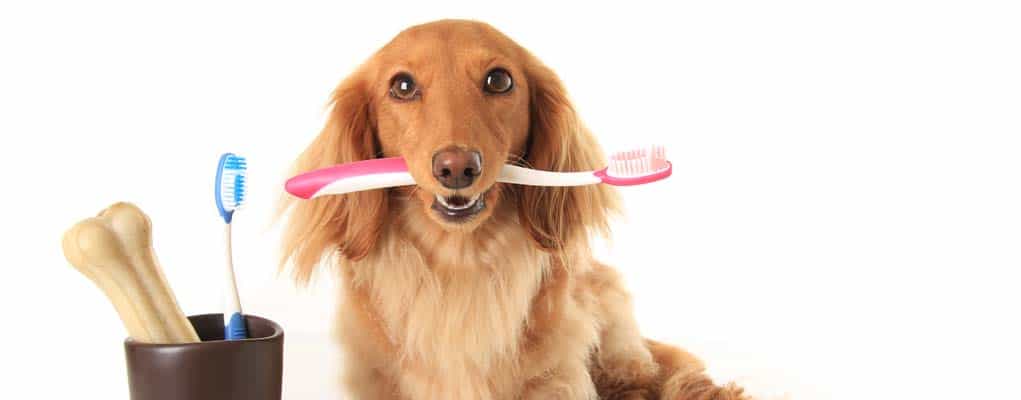
Your puppy will need some time to get comfortable with you touching their teeth.
Start with making your pooch comfortable with you touching their lips, let them lick your finger and you should start doing your work around the teeth area.
If you have adopted a dog who is a grown up, you have to take more efforts if their previous routine didn’t involve brushing.
The dog finger toothbrush is designed such that you can wear it on your finger and easily brush your pet’s teeth.
It is also helpful when something is stuck in your dog’s teeth and needs to be removed.
Dog toothbrushes have softer bristles than human toothbrushes.
The types of brushes available for cleaning a dog’ teeth are: regular, dual and finger.
Choose a toothbrush according to the size of your dog’s mouth and your ease of brushing them.
2. Canine Toothpaste:
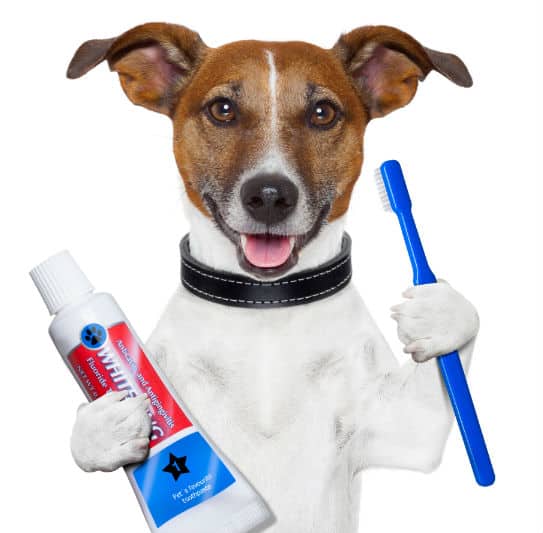
The next thing on dental care for dogs list is a Canine Toothpaste.
You can start making homemade dog toothpaste by using baking soda and water.
When choosing a toothpaste, make sure it is free of xylitol, artificial sweeteners, and preservatives. Xylitol is toxic to dogs.
Some pastes also have added flavors, for dogs who have a liking towards different flavors will like these pastes.
Dogs will naturally swallow the toothpaste you brush them with.
Dog toothpaste has added flavors of chicken, peanut butter or mint which are not harmful to the dog even if he swallows it.
So, it is necessary to use dog toothpaste.
Human toothpaste has xylitol which is harmful to your dog friend.
Never brush your dog’s teeth with human toothpaste.
3. Chews And Bites:
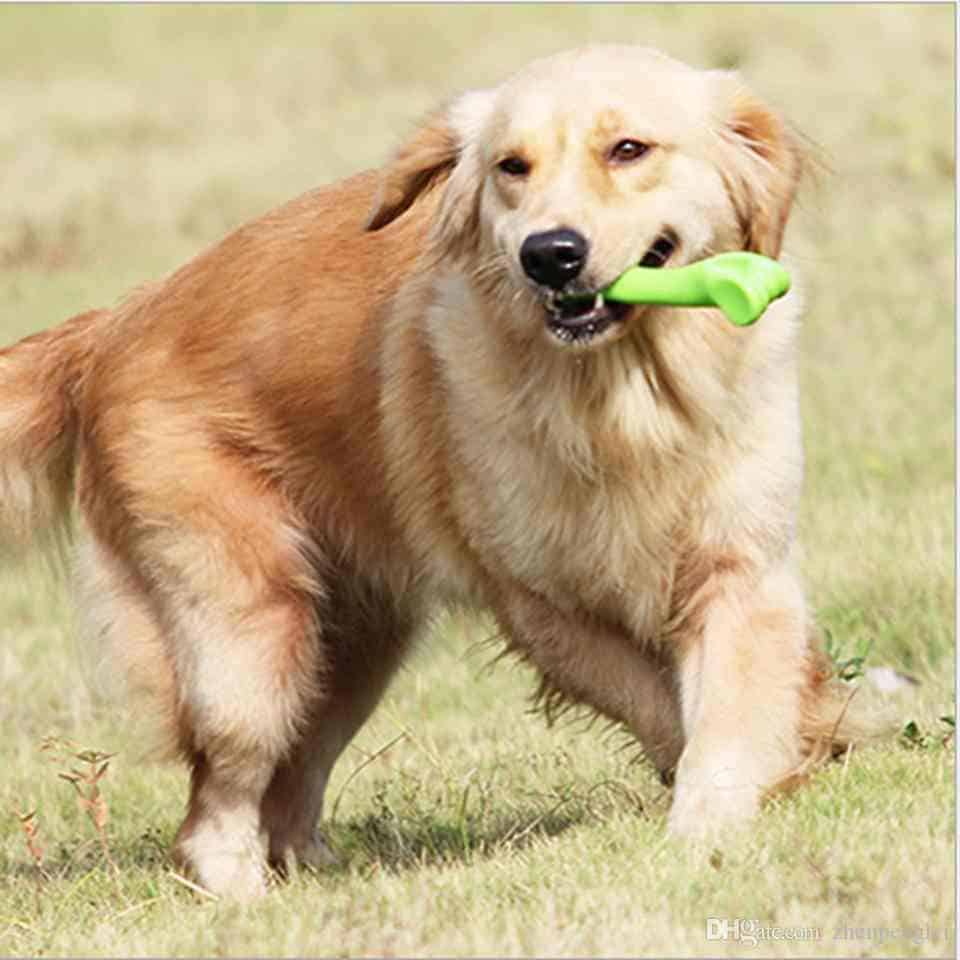
The third thing on the list of dental care for dogs is chews and bites.
If you’re not ready to start with brushing their teeth, there are other ways which can be used to prevent tartar and plaque.
When you’re choosing a chew toy for your canine friend you should keep in mind the following things:
- Dog’s size, personality, and temperament.
- The size of the dog determines the number of treats they get.
- Hard bones, pig’s ears, contaminated beef bones should be strictly avoided.
Chews and bites are available in the market which strengthens a puppy’s gums
Choose a dental chew which is flexible.
Chews made with potato starch are very flexible.
Potato starch helps in having a fresh breath and removes plaque and tartar.
Supervise your puppy when they chew as it might get the GI obstructed or lead to a fractured tooth.
Chew toys can also help reduce bad breath.
Aggressive chewers may swallow the chew toy which may cause choking or blockages.
Visit your vet immediately if your dog swallows a chew toy.
Provide your puppy with fresh water when they are having their chews.
4. Wipes or Pads:
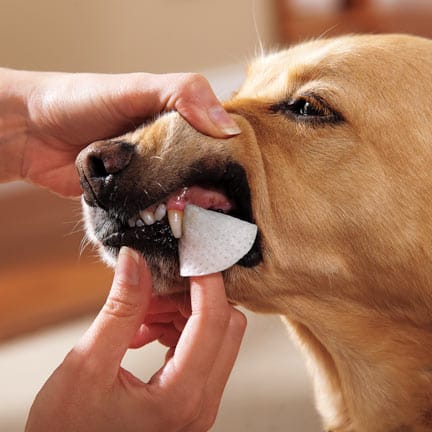
The next thing on the list of dental care for dogs is Wipes or Pads.
For times when there is no time for brushing or when your dog is not letting you use a brush or your dog generally hates the toothbrush, this is what you can use a dental wipe.
Often a dog’s teeth accumulate food particles, tartar or plaque on the surface of their teeth.
Dental wipes are a nice way to introduce your dog to oral hygiene.
These are disposable, uniquely textured and easy to use.
Some wipes are even flavored which help the dog to start liking the product.
When choosing the right wipes for your dog, select a wipe that is suitable for the size of your dog’s teeth.
If you have an adopted dog or an adult dog, you need to give them time to feel comfortable with you touching their mouth.
Once they have adjusted to your touch, you can shift to using a toothbrush or continue using a dental wipe.
Do not let your dog swallow the wipe.
5. Chew Toys:
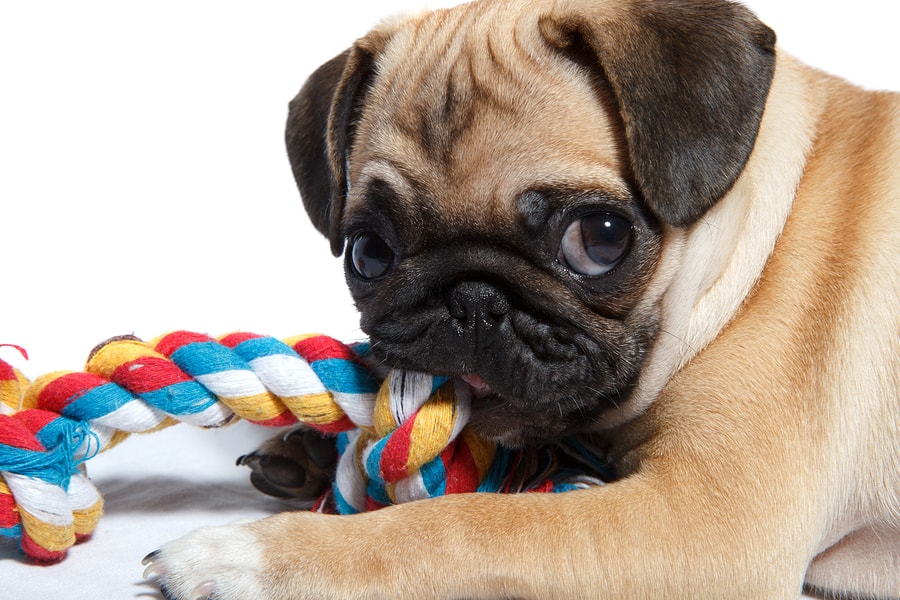
The fifth thing on the list of dental care for dogs is chews toys.
Selecting a chew toy for your puppy is not as easy as it seems.
A 3-week old puppy has just started to develop teeth so it is better to keep soft toys for him.
Puppies between age 3-9 months start teething and so hard toys should be avoided.
Give them soft toys till their jaw becomes strong.
Before buying a toy, ensure that it is safe for dogs as your dog will be a busy gnawing, biting and playing with it most of the time.
Also, keep in mind your dog’s jaw size.
If you buy toys smaller than their jaw size then it might result in choking.
Whereas if it is larger than his jaw size, they will lose interest in playing and start playing with your favorite pair of shoes.
General Concerns
Bad Breath In Dogs:
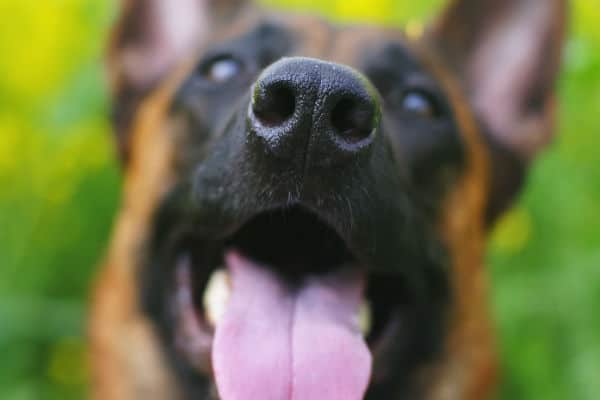
Dogs, in general, do not have a very pleasant-smelling mouth.
However, dog owners know when it smells abnormal.
This factor of having bad breath could be an underlying reason for diseases or improper grooming.
Reason 1: Plaque Build Up
Because of bad oral hygiene, not brushing your dog’s teeth, it may lead to bad breath.
Dog’s oral hygiene is as important as human’s oral hygiene.
Not taking care of regular brushing can lead to the build-up of plaque (responsible for bad breath), periodontal disease or it may push away gums from the teeth.
There is an inflammation of the gum and it creates more space for bacteria to build up and form cavities.
Reason 2: Unsupervised Snacking
If your dog has a habit of putting their mouth in the trash to explore for something or if you have cats at home or if the dog has coprophagia then your dog is likely to eat your cat’s poop or its own poop.
They can also consume toxic substances or dead animals which isn’t good for their breath or their health.
This may result in bad breath.
The only reason to stop this is supervised their whereabouts to know what they are eating.
Reason 3: Medical Condition
When you have ruled out the above conditions then it may be a medical condition.
Medical conditions targeting the liver, gum, kidney or even diabetes may cause bad breath.
Listed below are some diseases and some signs to look out for which affect the dental health of your pooch
Professional Care
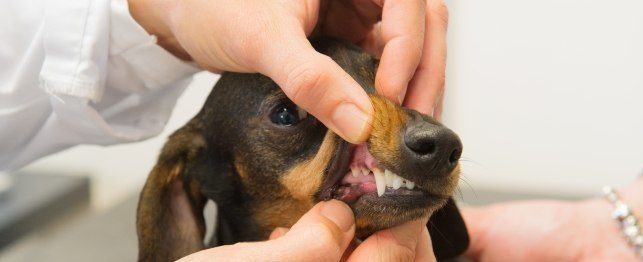
Dental cleaning is also called dental prophylaxis.
Professional dental care is required regularly to remove plaque and tartar.
Professional clean up involves thorough scaling of teeth, close inspection of the teeth, gums and mouth and polishing.
General anesthesia is given to the dog to give them uninterrupted cleaning.
Anesthesia-free dental care is also available.
Dogs who are suffering from a medical condition should avoid anesthesia because of risk in complications.
Some dental clinics not only clean the visible surface but also take an x-ray to know if there is any problem in the root of the teeth or gums.
Extraction of loose, affected or fractured teeth can also be done in a professional dental visit.
Dental Problems
1. Periodontal Disease:
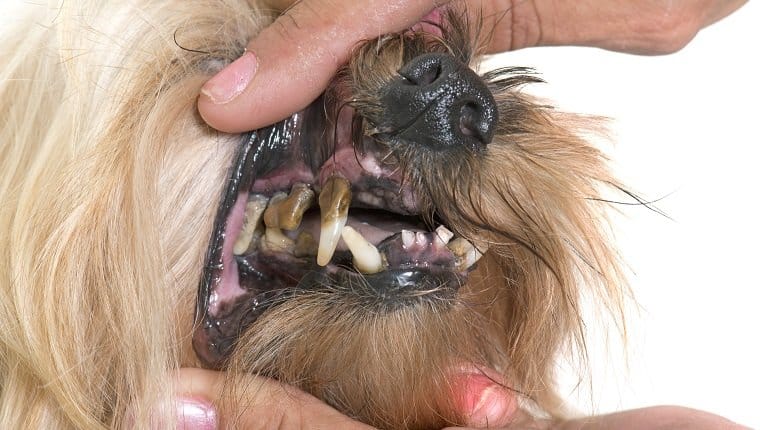
Dogs are prone to periodontal disease 5 times more than humans.
It is a common disease affecting dogs and cats.
By the age of 3, this disease starts showing signs.
Other than bad breath, bleeding gums, pus around the gums, red gums, loss in appetite or difficulty in chewing food, drooling or staying irritated are some symptoms of this disease.
To cure this, treatment is done in 4 stages.
The first two stages involve cleaning of the tartar and plaque.
Along with this, it involves check-up of all the teeth individually.
In the 3rd and 4th stage, a course of action is taken against the disease that is found in the previous stage.
It involves root planning, subgingival curettage, periodontal debridement, gingivectomy, periodontal surgery, tooth extraction, and special therapeutics.
2. Cysts:
Oral cysts are sacs filled with fluid and are mostly found near the tooth which did not erupt.
The sac expands and affects the nearby bones and teeth.
If it gets severe, it can lead to a pathological fracture in the jaw.
It is easily identified as the blueish swelling of gums.
To cure this, surgery is required.
A biopsy of the cyst may be required to know other life-threatening diseases.
To cure this early, you should take your puppy for regular physical tests which involves a complete oral test and it can be prevented before the cysts even emerge.
3. Halitosis:
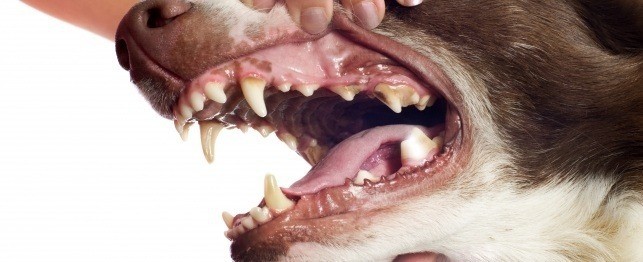
This gives out bad odor from the oral cavity of the dog.
Most of the time the underlying cause is periodontal disease.
This is a bacterial disease, caused by tartar, food particles stuck in the cavities, bleeding in the mouth due to coagulation abnormalities and tissue necrosis.
The treatment involves a thorough cleaning of the tooth professionally so that the root cause of the problem is eliminated.
Some affected tooth in the verge of getting destroyed is often extracted in the professional dental cleaning process.
4. Gingivitis:
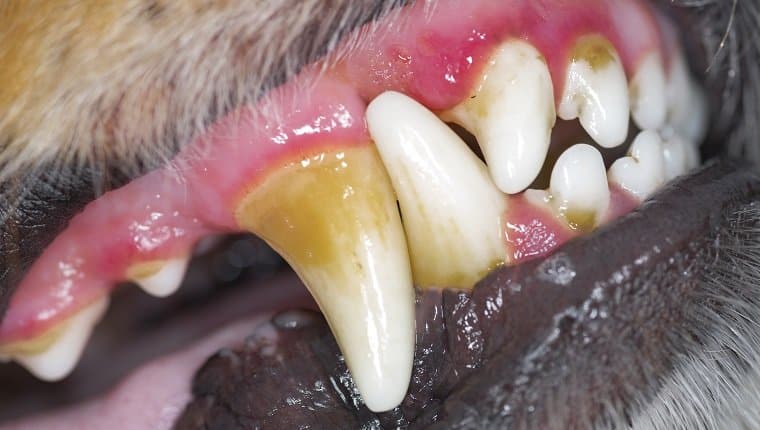
This disease is marked by inflammation of the gums and is very common in dogs.
It is caused by bacteria and starts paining when it grows to be severe.
Pain may also lead to bleeding from the gums.
This can easily be prevented if regular brushing and teeth cleaning of the dog is taken care of.
This can also lead to advanced periodontal disease.
Some symptoms of the disease include thin, red line along the gums, pain around the mouth, the build-up of plaque and tartar, loose teeth, receding gums, and bad breath.
5. Tumours:
Oral tumors are generally seen in the dog’s lips, tongue, gums and lymph regions surrounding the mouth.
The symptoms include tooth movement, oral sores or bleeding, excessive drooling, reluctance to chew and bad breath.
It is treated by surgery, the areas near the tumor are checked to know the extent of the spread.
It is sent for a biopsy and if the tumor is cancerous, other treatments are followed.
Taking care of dog’s dental health is as important as giving him potty training.
Regular brushing and occasional professional cleanings would help to keep your pooch’s teeth healthy.
Keep observing their teeth and gums so that if you see any symptoms then it can be prevented before it grows to be severe.
We hope this article was informative enough!
Tell us what you would like to read next
Comment down to share your tips to clean a dog’s mouth.
Happy petting to you!



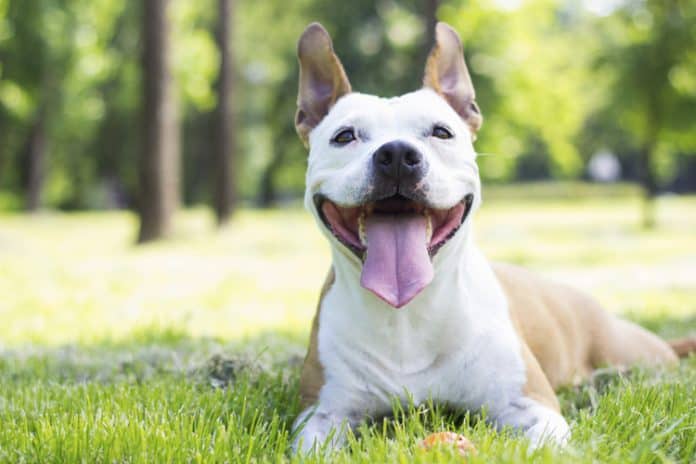









[…] Suggested: Dental Care for Dogs […]